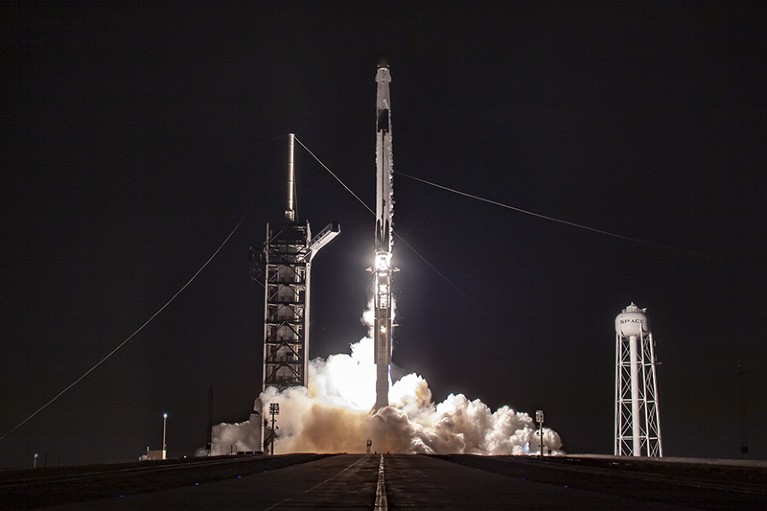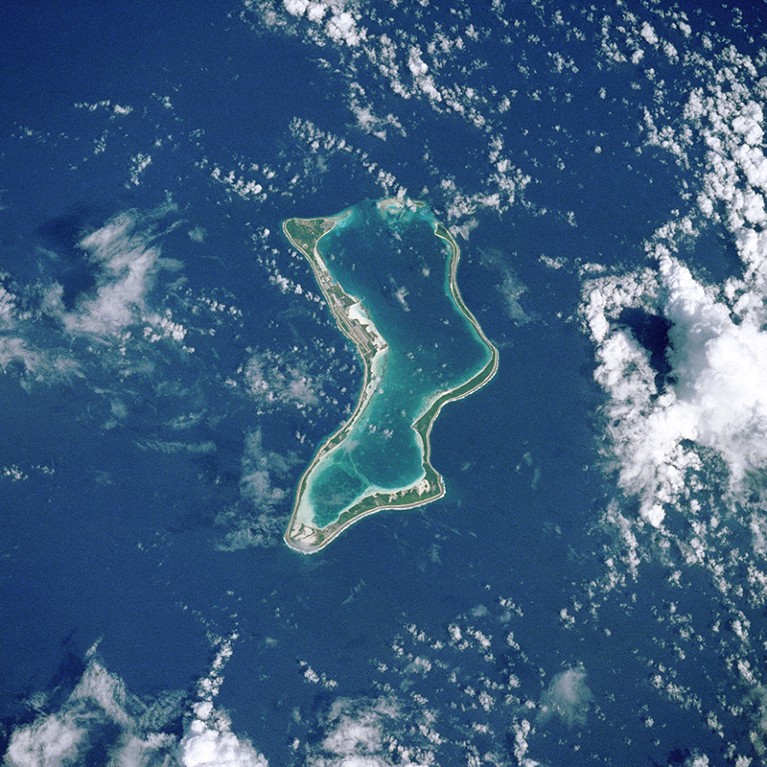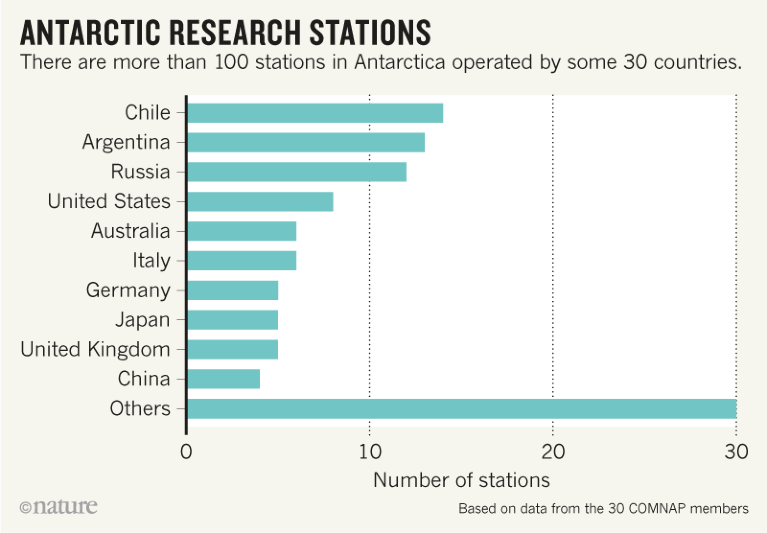SPACE
SpaceX crew craft reaches space station The first private spacecraft able to take astronauts to the International Space Station docked with the orbiting outpost on 3 March, a day after launching from NASA’s Kennedy Space Center in Cape Canaveral, Florida. The Crew Dragon spaceship, built by SpaceX of Hawthorne, California, is part of NASA’s plan to use commercial companies to ferry astronauts to orbit. On this test flight, it carried a mannequin. Its first crewed flight, carrying two former space-shuttle astronauts, is expected later this year. Crew Dragon is a version of the spacecraft that SpaceX has been using to carry cargo to the space station since 2012.

SpaceX’s Crew Dragon capsule launched from Cape Canaveral, Florida, on 2 March.Credit: SpaceX
Hubble camera fails One of the Hubble Space Telescope’s two main cameras, the Advanced Camera for Surveys, stopped working on 28 February because of a software glitch. Engineers are working on ways to diagnose and fix the problem. Astronauts installed the camera aboard Hubble in 2002; its power supply failed in 2007, and other astronauts fixed it in 2009 on the final servicing mission to Hubble. The telescope’s other three science instruments continue to operate normally, NASA said in a 2 March statement.
HEALTH
Ebola outbreak Violence in the Democratic Republic of the Congo (DRC) continues to impede efforts to fight the ongoing Ebola virus outbreak there. The aid group Médecins Sans Frontières (MSF, also known as Doctors Without Borders) suspended its activities near the outbreak’s epicentre on 28 February and evacuated staff members from the area. The group cited an attack the day before on a treatment centre in Butembo, where people set buildings and vehicles on fire, and another on 24 February at a treatment facility in Katwa. “In light of these two violent incidents, we have no choice but to suspend our activities until further notice,” said Hugues Robert, emergency desk manager for MSF, in a statement. The Butembo centre reopened to patients on 2 March, the DRC health ministry said. The Ebola outbreak in the DRC began last year, and, as of 4 March, at least 832 people have been infected with the virus and at least 498 have died.
EVENTS
Hungary support Germany’s universities and major public research organizations — including the Max Planck Society, the German Research Council and its national academy, the Leopoldina — have written a joint open letter to Hungarian innovation minister László Palkovics defending the Hungarian Academy of Sciences (HAS) against a threat to dismantle it. A government decree passed last summer ordered the restructuring of the HAS’s network of research institutes and the transfer of its budget to Palkovics’s ministry. The ministry is temporarily withholding the institutes’ 2019 running costs, and has recommended that some institutes be closed or merged with universities. The group of German research bodies rarely criticizes other countries’ policies publicly. Its letter, dated 19 February, says that the “constraints are not in keeping with the principle of academic freedom”. It states that Hungary’s recent scientific successes are thanks to this principle, and warns that a loss of academic freedom risks a backward step in terms of competitiveness and international collaboration. The HAS has received several other letters of support over the reforms from academic institutions and people around the world.
PEOPLE
Environment chief The US Senate voted on 28 February to confirm Andrew Wheeler, a former coal lobbyist, as head of the US Environmental Protection Agency (EPA). Wheeler had been the agency’s acting administrator from July 2018, when former EPA chief Scott Pruitt resigned amid numerous investigations into ethical breaches. Wheeler has continued the regulatory rollbacks that Pruitt initiated, advancing proposals to weaken regulations on greenhouse-gas emissions from automobiles and power plants. The Senate vote on Wheeler’s nomination fell largely along partisan lines, with all but one Republican voting in the affirmative; Democrats united against the nomination.
POLITICS
Illegal occupation The United Nations’ highest court has ruled that the United Kingdom’s occupation of the Chagos Archipelago in the Indian Ocean — home to one of the world’s largest marine protected areas — is illegal, and called for the territory’s return to Mauritius. Britain held on to the Chagos islands (pictured) when the rest of Mauritius became independent of the United Kingdom in the 1960s, although Mauritius has never recognized Britain’s claim. Starting in the late 1960s, Britain expelled the Chagos’s 1,500 or so inhabitants to lease one of the islands — Diego Garcia — to the United States for a military base. In 2010, Britain created the 640,000-square-kilometre marine reserve around the Chagos, but government documents leaked at the time suggested that one reason for the move was to frustrate Chagossian efforts to return to the island. The 25 February ruling by the International Court of Justice in The Hague, although advisory, strengthens Mauritius’s claim to the islands; it says that the United Kingdom’s creation of the marine reserve infringed Mauritius’s sovereign fishing rights.

The Diego Garcia coral atoll is part of the Chagos Islands, a disputed territory.Credit: NASA/SPL
Climate policy An Australian government plan to spend Aus$3.5 billion (US$2.5 billion) to reduce the country’s greenhouse-gas emissions has been criticized by scientists because it will not help the nation meet its Paris climate commitments. The centrepiece of the Climate Solutions Package, announced on 25 February, includes a Aus$2-billion Climate Solutions Fund, which will pay industry and farmers to voluntarily reduce carbon emissions between 2020 and 2030. Australia has agreed to reduce its emissions by between 26% and 28% from 2005 levels by 2030. But scientists say the new policy proposal is a minimal effort that will do nothing to transition the country away from using coal-fired power stations and natural gas, and towards renewable energy, which is necessary to reduce emissions and meet its targets.
POLICY
Harassment data The US National Institutes of Health (NIH) investigated allegations of sexual harassment at more than two dozen universities last year, the agency said on 28 February. The NIH ultimately replaced 14 principal investigators who had received agency grants, and 21 principal investigators were disciplined or fired by their employers. Fourteen people were banned from participating in NIH peer-review panels. The announcement marks the first time that the agency has publicized the number of its grant recipients who were fired or disciplined as a result of harassment findings. “Sexual harassment damages the careers of those who encounter it, & can leave deep scars & psychological effects that reverberate for a lifetime,” NIH director Francis Collins said in a series of tweets. “We are sorry that it has taken so long to acknowledge and address the climate and culture that has caused such harm.”
Gene-editing rules China’s health ministry has issued draft regulations that will restrict the use of gene editing in humans. The regulations come in response to claims from Chinese researcher He Jiankui, late last November, that he used gene-editing technology to alter the genomes of embryos to make them resistant to HIV. He then implanted the edited embryos into women. The regulations, issued by the National Health Commission on 26 February, state that gene editing in any type of cell that will end up in humans, including embryos, will need the commission’s approval — as will other high-risk procedures, such as gene therapy and stem-cell technologies. The proposal also lists penalties for breaking the rules, including fines and blacklisting from grant applications.
TREND WATCH
On 25 February, Turkey became the 36th country to open a base in Antarctica. In 1959, the 12 nations — including the United Kingdom, the United States and South Africa — that had a presence on the continent at the time signed the Antarctic Treaty. They agreed to use Antarctica for peaceful purposes, to cooperate in research and to make research results freely available. In the 60 years since, the number of stations, bases and airfield camps has grown sevenfold, to 109 in 2018 — reflecting a growing interest in Antarctica, both scientifically and from the public. According to the Council of Managers of National Antarctic Programs, 98 of these stations are currently open; about 40 are open all year round; others are open when weather permits; and some are temporary bases like Turkey’s, founded in a bid to establish a more permanent presence on the continent. Antarctic ice sheets have a crucial role in global sea-level rise, says Alexandra Isern, head of the Antarctic Sciences Section at the US National Science Foundation’s Office of Polar Programs. “The public increasingly recognize that polar systems are connected to global systems, which are important to people everywhere.”

Source: Council of Managers of National Antarctic Programs (COMNAP)



